#i do have issues with like... mixing up regional language differences though. because my teachers all taught different dialects -
Explore tagged Tumblr posts
Text
i need to work on learning spanish again
#i was in public school classes from 6th to 11th grade but my skills are still dogshit#mostly bc we barely learned anything for the first three years since all of our teachers were uh. white american ladies who were only -#- really fluent in basic conversational spanish#and then all of my teachers after that were native spanish speakers who wrongly assumed that our previous teachers actually taught us enough#so they ended up teaching more than we could pick up on since we didn't have the framework#i suck at actually speaking my own thoughts but i can read/write it decently well?#or at least well enough to get the point across. there might still be grammar errors but it's not unreadable#i do have issues with like... mixing up regional language differences though. because my teachers all taught different dialects -#- and it's awfully easy to forget which words can be said where#no soy muy bueno en español pero hago mi mejor esfuerzo#no creo que mi gramática sea tan mala pero definitivamente tampoco es genial#mis clases de español no eran increíbles ¯\_(ツ)_/¯#pero estoy haciendo lo mejor que puedo aquí
2 notes
·
View notes
Text

in honor of a recent rise in roleplays set in the uk, coinciding with the recent global success of the new british netflix show sex education, i was inspired to create this guide to roleplaying british characters. as a british kid myself i love seeing these characters in rps, but have often had friends in the rpc tell me that they struggle to write them due to the differences in popular culture, dialect, slang, media etc.
of course, accuracy isn’t TOO important when it comes to this, since british people generally aren’t a marginalized or oppressed group. however i do think this is a guide a lot of people will find valuable. in a poll with 43 respondents, the highest percentage of roleplayers were from north america (72.1%) compared to only 9.3% coming from the united kingdom (all info correct at time of posting). with the assumption that people mostly write characters that are from the country they’re most familiar with, there aren’t a lot of british characters in tumblr rp. if this guide can provide non-UK-based rpers with the info they’re seeking to pen a british muse, then my job here is done!
DISCLAIMER: if you were looking for a guide written like an essay or report, this ain’t it! this is mostly a collection of external resources you may find useful when writing your characters, as opposed to written instructions.
PLEASE, LIKE OR REBLOG THIS IF YOU FOUND IT USEFUL IN ANY WAY!
GEOGRAPHY — where will your character be from?
as a british person who isn’t exactly the most well-traveled, there are definitely inaccuracies in my knowledge of other countries’ geography. i wouldn’t be surprised if some people struggle with the same issue, but regarding the united kingdom. if your character is from the UK, it’s important to know that their characterization should differ depending on which part they’re from.
map of the british isles
map of england
map of scotland
map of wales
map of northern island
the difference between the UK, great britain, and england: explained
why is the republic of ireland not a part of the united kingdom?
NOTE: this guide will not include info on how to write characters from the republic of ireland, as that identity is one of its own and is not classified as part of the uk!
SOCIAL CLASS — what kind of socio-economic background will your character have?
class is an important issue in the UK, in some ways more-so than the US. the first bullet point of this section is an interesting article which explains why this is, but to summarize: the american dream – though flawed, is a reality to an extent. there is no such concept in the UK, making the class situation and socio-economic divide a little different.
“in the uk, i’m working class, but said goodbye to that title in america” article
the seven social classes of 21st century britain — where do you fit in?
POLITICS — what kind of stance will your character take?
just like in any country, politics is extremely important in the UK. just like in america, the country is extremely divided between left and right. if political views is something your character views as important, or you think that their politics defines their characterization in any way, this section should be helpful!
parliamentary (UK) vs. presidential (US) democracy, explained
the uk’s many political parties, explained ( NOTE: this video is slightly outdated. the prime minister, and leader of the conservative party, is now theresa may, not david cameron. but you probably already knew that. )
uk political spectrum
2017 uk general election map
brexit, explained
to summarize the two main parties: labour = left-wing = good. conservative = right-wing = bad.
ETHNIC DIVERSITY — what kind of ethnic background will your character have?
similarly to the US, the UK (though dominated by caucasian people aka white british) encompasses many different cultures. according to the UK gov “87% of people in the uk are white, and 13% belong to a black, asian, mixed or [from] other ethnic group[s], according to the combined 2011 censuses.” while non-white ethnicities are a definite minority, it’s so important not to erase their existence.
a chart illustrating the uk’s race / ethnicity breakdown
britain’s most racially diverse areas
2011 census reveals most ethnically diverse city
IDENTITY — what kind of cultural identity will your character have?
ask a scotsman for a handful of reasons he’s different from an englishman, and he’ll talk for hours. within england alone, ask a londoner how they’re different from a mancunian and they’ll talk for even longer. different parts of the uk have different identities, and it’s important. something we want to avoid is the “posh”, well-spoken, crumpet-eating stereotype or, on the other end of the spectrum, the modern-day oliver twist. expand your horizons!
stereotypes americans have about british people that aren’t actually true
10 differences between brits and americans
what does it mean to be british?
ENGLAND
how is the south of england different to the north? (spoiler: very)
north-south divide wikipedia
culture of england wikipedia
SCOTLAND
our scottish culture: so much more than kilts and bagpipes
scottish culture and traditions guide
culture of scotland wikipedia
WALES
wales history, language and culture
welsh culture: facts and traditions
culture of wales wikipedia
NORTHERN IRELAND
northern ireland – cultural life
northern ireland history and culture
culture of northern ireland wikipedia
LANGUAGE, DIALECT, ACCENT, SLANG — how will your character speak?
here’s where the fun parts start! there are so many different variations of accents, regional dialects, area-specific slang and colloquialisms throughout the uk. sometimes i see british characters being written with little to no use of any of these, nothing at all differentiating them from american characters and it’s such a waste in my opinion. even if you don’t like writing with a an accent (some people don’t!) the dialect and slang words along can make your character so much more authentic.
how are british english & american english different?
everyday american words we don’t use the same in the UK
america vs british english – 50 differences
NOTE: resources for the north of england are higher in quantity than the midlands and south of england due to wider variations of accents within the region.
ENGLAND (NORTH)
a tour of northern english accents
a - z of northern slang (GENERAL NORTHERN)
northern slang with blossoms (GENERAL NORTHERN)
a - z of mancunian slang (MANCHESTER)
mancunian: english like a native (MANCHESTER)
scouse: english like a native (LIVERPOOL)
scouse slang (LIVERPOOL)
geordie slang (NEWCASTLE)
mackem slang (SUNDERLAND)
yorkshire slang (YORKSHIRE)
the yorkshire accent (YORKSHIRE)
sheffield slang (SHEFFIELD)
arctic monkeys slang lessons (SHEFFIELD / YORKSHIRE / GEN. NORTHERN)
ENGLAND (MIDLANDS)
how to speak birmingham (BIRMINGHAM)
a brummie accent (BIRMINGHAM)
7 things said in nottingham (NOTTINGHAM)
black country dialect (BLACK COUNTRY)
ENGLAND (SOUTH)
10 common british/english slang expressions & phrases (NON-SPECIFIC)
cockney (LONDON)
cockney rhyming slang: english like a native (LONDON)
roadman slang vs cockney slang (LONDON)
london street slang, translated (LONDON)
west country: english like a native (WEST COUNTRY / SOUTH WEST)
essex slang (ESSEX)
mark watson on bristol slang (BRISTOL)
slang of the south - portsmouth (PORTSMOUTH)
WALES
welsh people on welsh slang (GENERAL WELSH)
taron egerton talks welsh slang (GENERAL WELSH)
common welsh sayings (GENERAL WELSH)
luke evans on welsh slang (GENERAL WELSH)
25 words and phrases you’ll always hear in cardiff (CARDIFF)
swansea slang (SWANSEA)
20 welsh colloquialisms (GENERAL WELSH)
29 words that have a totally different meaning in wales (GENERAL WELSH)
welsh language wikipedia
SCOTLAND
how to speak & understand glaswegian (GLASGOW)
gerard butler teachers you scottish slang (GENERAL SCOTTISH)
glasgow slang words (GLASGOW)
most used scottish slang words & phrases (GENERAL SCOTTISH)
doric from around aberdeen (ABERDEEN) note: definitions in description
edinburgh dialect words (EDINBURGH)
trainspotting slang explained (GLASGOW / GENERAL SCOTTISH)
scottish words glossary (GENERAL SCOTTISH)
glossary of scottish slang & jargon wikipedia (GENERAL SCOTTISH)
handy scottish words to know (EDINBURGH / GENERAL SCOTTISH)
28 great scottish sayings and slang phrases (GENERAL SCOTTISH)
use of gaelic in scotland wikipedia
NORTHERN IRELAND
jamie dornan teaches you northern irish slang – vanity fair (GENERAL N. IRISH)
jamie dornan does northern irish slang – bbc (GENERAL N. IRISH)
28 sayings from northern ireland (GENERAL N. IRISH)
northern irish words (GENERAL N. IRISH)
16 slang phrases you’ll need to know in northern ireland (GENERAL N. IRISH)
17 words and phrases you’ll always get in belfast (BELFAST)
a list of belfast sayings (BELFAST)
derry slang words 1 (DERRY)
derry slang words 2 (DERRY)
use of gaelic in northern ireland wikipedia
SURROUNDINGS — what’s it like where your character grew up, or where they live now?
whether your character comes from one of these places OR lives there now (or both!) it might be interesting to incorporate some of their surroundings into their characterization. this section isn’t classified by country/region, because if i were to start going into that much detail here, this guide would go on forever!
10 incredible historical towns in the uk
where are the largest cities in britain?
a guide to the english countryside
the 15 most stunning places in the uk outside of london
top 50 areas for quality of life in the uk
10 best party cities in the uk
10 best student cities in the uk
10 of the uk’s most creative towns & cities to live, work & play
cities with the youngest vs oldest age population
map of stereotypes in the uk
google autocomplete map of the uk “why is [city]...”
POP CULTURE / MEDIA — what does your character like? what are they consuming?
us brits are very proud of our own british-made media. our television, our music, our cinema, etc. if you’re somebody who is interested in including the things a character likes in their characterization, it would be unrealistic not to give a british character some favourites from the place they’re from.
uk map showing where tv shows are set and filmed
uk map showing the origins of famous bands/musicians
the uk’s most popular tv shows according to IMBD
10 best british rock bands of the 21st century
the ultimate reference guide to british pop culture
LASTLY, HERE ARE SOME RESOURCES ON WRITING BRITISH CHARACTERS:
making british characters realistic as an american writer
tips from a brit for writing british fictional characters
another ‘writing british characters’ guide by @thewritershelpers
another ‘writing british characters’ guide by @writeworld
another ‘writing british characters’ guide by @rphelper
how to write dialogue for british characters
writing black british characters by talkthepoc on wattpad
of course, this is overkill. there’s no way on earth you’ll ever need all of these resources, but they’re here and i hope you find some use out of this guide! please forgive any inaccuracies or mistakes, this is my first time writing a guide. you’re welcome to leave me feedback on this here. last but not least, HAPPY WRITING!
114 notes
·
View notes
Text
Chairman and Managing Operational CEO (Global Legal Authority Quasi Judicial)
(Finance, planning, industry and foreign trade portfolios) Private
Head of Human Resources Finance and People and Global Head of Corporate Responsibility
Investments/Contracts/Superior/Technically Competent and Right-Hand Men
NGO - (Finance, planning, industry and foreign trade portfolios) Private
To my Pharma Hubs, Technology Hubs, Social Creative/Personal Hub, My Private Hubs, My Financial Hubs and my Health and Wellbeing/Scientific Hubs, Legal and Innovation Hubs, Hinterland Hub and to my Eastern Caribbean Hub, Linguistic/Psychology Hub, to my beloved additions and to my Institutions and Partners and Team, Pool of Potential Personal Assistants and Private Secretaries and Business Managers and also to my Fitness Hub which is an extension of my Health and Wellbeing Hub and not to forget my beloved Brooklyn Hub and my Wine/Adviser Hub and my Influential Legal Cashier.
Even the Network and my local friends and The Global Structure and my Linguistic Hub regarded the speech as too radical for the occasion. My OLC and my Property Expert Guy and my Influential Adviser and Partner, considered me as morally courageous and politically correct. "The proposition is indisputably true ... and I will deliver it as written. I want to use some universally known figure, expressed in simple language as universally known, that it may strike home to the minds of men in order to rouse them to the peril of the times." And with the scope of our reach and Intellectual Capacity expanding due to the corroborating work of my Intellectual Partners, I must conclude that I am with the right companion to fuel Intellect, providing a guarantee of reliability against intermittency and in so doing enabling a broader application of our Programs and Initiatives and further responsibility to the Environment.
The Network and the Global Structure and this community of Corporations and Team and Business and Partners and Institution Globally; that live within the walls of the Global Structure is the correct mix necessary to balance our statement of Intent internationally and to further provide an environmentally sound economy. We will deliver on the Economy and we will deliver benefits for all the stakeholders. We will deliver on Good policy which requires an honest and open consideration of the pros and cons of each available Independent Intellect. The right policy framework and transparency can deliver a rapid start-up of mothballed or works as the correct fuel to deliver the plot that is needed to deliver Intellectual Capacity. This Network and the Global Structure will be providing A different approach on delivering policy for the Network Community and for these Corporations that sit within the walls of this Global Structure. We will deliver formidable environmental Policies. We will deliver on shared prosperity and we will win on pay and we will win on the Economy. We must win and we must delivery for humanity.
This Sector and industry are seeing transformational change, with new Partnerships unlocking previously unreachable resources; new players and new Intellectual Capacity; questions about which region will be most viable locally, regionally, globally. Questions about our trade policy. What does that mean for the Network and the Global Structurer? I would argue that substituting mediocrity for Intellect in all cases the stakeholders will have no regrets. Further it will lead to meeting the needs of the Environment trilemma. I will address this in my Fire and Brimstone Address to Intellectuals Globally merging it with my Inauguration Speech. We will deliver for Economic, we will deliver for full capacity policies and we will deliver and Environment first for these Community of Companies and further the Global Environment. We will and must have an opportunity, to contribute, to find a work process that meet our need for belonging and be in Control of our destiny and further to make a commitment to the Global Environment. You and I have an occasion with destiny, this family hear you, this family understand you, this family will deliver for humanity. Shared Prosperity, transferable hope, formidable minds and young men and women that can see vision, we will deliver on classic Intellect. It a job gift, it’s a gift to teacher and it’s a gift to Intellect. Intellectual Capacity will be abundant once the environment is influence with the right ingredients and with no intermittency issues. When I say that this Network and the Global Structure shall achieve and succeed, I mean exactly that, we will emphatically win and we will deliver for freedom, we will stop the environment will halt the shifting of burdens, we must win. It’s time to live your best life.
As this Network and this Global Structure and these community of my own Companies and Partners and Institution expand our policies will continue to drive the decisions investors and consumers make. With policies that support open-markets, free trade, and a level playing field, we can fully develop and deploy Intellectual Capacity around the globe for the benefit of individuals, countries and the future and further help us deliver for the environment. These environments will no longer support mediocrity. We will deliver for the Statement of Intent. We will win and you will win, and you will have an opportunity to live your best life because of the critical role and capacity that I and this Network and this Community will be operating in Globally, in all of the Economic life of all regions now and in the years to come. It is in our region across the Globe where the 21st century will truly unfold. We will win the Election and we must win. We will deliver the particulars and we will deliver the tool-kits and we will deliver the Statement of Intent. We will deliver because of shared prosperity and because of humanity. Over the next couple of decades, about half of the world’s economic expansion is expected to take place right here in your Community. That’s why I was Elected Leader and the Network and Global Structure, and my values and principles and fundamentals was described as “the main engine of the economy.” You must win because you have a vast amount of Intellectual Capacity, we must win for Education and we will deliver for Intellect. Intellectuals do not lose, it’s a fools game. Even though you may have been blessed with abundant natural resources, they weren’t easily accessible. I have begun to change that; this Network and this Global Structure will win for shared prosperity. We must win. It took leaders with a vision … to turn those natural blessings into tangible benefits for the its stakeholders and for the economies of this Network and tis Global Structure. A vision … for a project that could write a new chapter in the economy of this nation. A vision … to break down barriers to facilitate partnerships between the public and private sectors. And a vision … to make the delivery of those particulars and Office and Portfolios a reality, which will happen because my Property Expert Guy and my OLC and my Personal CEP and my Influential Advisers and I will deliver.
Truth to Tell, tell it First and Tell it like it is.
We will win and we have won. I’m delighted that the policy with regards to our statement of Intent will be announced in the coming weeks as we deliver the Offices and we deliver the particulars. This Network and the Global Structure began to deliver, and we will continue to deliver. When I say we must win, I mean emphatically that we will win. We will win in every region and we will win in every valley. We must win.
I love you, yes you; it’s real money and it’s a capacity that can never run dry. Great work Private Hub, Great work Eastern Caribbean OLC, Great work Influential Adviser and Great work to my Dutch Hub and Dutch CEO. This family hear you, this family will deliver for Humanity. We will win and win and win. I love you, and yes! Can you smell what the rock is cooking? It is as a fire and as a hammer that breaks the rock into pieces. Truth to Tell!
Chairman and Managing Operational CEO (Global Legal Authority Quasi Judicial)
0 notes
Text
Learning to speak French and its challenges for myself and other learners
Speaking/learning a second language requires a certain level of patience and the ability to take constructive criticism. SOMETHING I AM VERY BAD AT TAKING!!! I feel so bad for people who are learning English in the States. Why? Because I have seen people correct foreigners or ‘New’ Americans for using British English or saying something even slightly incorrectly, when more than half of us can’t even use the word supposedly correctly. Soon I will be flying to Europe a lot for work and I am going to have to deal with one of my least favourite group of Francophones... Americans. Not all of them are horrendous... Just 90% of them MDR. Nothing irritates me more than someone nit-picking my pronunciation than a group of people who think they know it all because they learned from a textbook, or that one French guy from Paris that they dated 4 years ago. Not that I have issues with one particular group of speakers like the Parisians, but there are so many words in French and so many different accents and dialects. My French is a bit bizarre to be honest; however, it is not incomprehensible. How does ones second language qualify as bizarre??? When your interests, culture, practical experience, and instructors don’t align. Like stated previously, I started learning French from my family, some members who moved there when I was very young, followed by some in middle school from a French/American woman who taught us text book French. So I had a little background before I began speaking airport French to Quebecois and French passengers on Lufthansa and Air Canada, as a contracted agent. 50% of my Francophone passengers were Quebecois, a good 20% were French. The rest were Swiss, Belgian, or of African origin. My ear became fine tuned to different types of French, but my tongue and my interests went with the Canadians. It already conflicted with my Senegalese Friends who worked at the airport who were trying to teach me a more international French. Their French stuck with me too. Their grammar was impeccable!!! When they helped me correct my papers, they taught me worldly phrases to describe my own life. At the time, for example, I was une préposée aux bagages. Not a phrase you learn in beginners French. My college instructor was one of the best French speakers in the nation. In my opinion, à mon avis, there is French from a certain region, and then there exists textbook French. This is the same French you might hear in Franco media. It is without a distinct accent, it is perfect grammar,and you will not hear this French at the bar in Marseilles or on the streets of Paris. Ange, my instructor, spoke this perfect French while he taught us pronunciation and other grammar aspects. Ange knew that I had a profound love for Quebec. He also knew that our class textbook taught a lot of Quebec French. To me, it only makes sense that we could be getting our books from Montreal and not Paris, as Canada is closer. Ange chose not to teach some of the grammar, the stuff he found peculiar. Some of it is different, but it’s not inaccurate information. This goes to show that second/ third/ fourth languages can be formed by perspective and the cultures you are exposed to. People who understand or learned one dialect/ accent, and speak negatively about another tend to be more difficult for me to speak with. They correct you with something you learned and try to replace it with their version. This is why I do not speak with a lot of American speakers. Nothing irritates me more than an American girl who fucked some French guy and criticizes me for saying “gilet de sauvetage” without emphasizing every fucking syllable. Her version “geelay deh sow-ve-tahge” and my version “geelay deh sowvetage”. Of course it was a flight attendant. I CANNOT! I also had a tutor who insisted I speak like a Parisian. Chui fucking NORTH AMERICAN putain! Then the lady talked shit about my instructor and I lost all trust... Different issue. I stopped seeing the woman for help because of her biased views on how I should say things (of course she was American). I also have a friend in Montreal who I have become quite timid with my French. I need to have a spine and just speak. She just drives me a little crazy because she has a tendency to correct me and not tell me what I should say instead. I have had a tendency to mix doing the dishes, faire la vaisselle, and doing the laundry faire la lessive in French. I made the mistake of trying to say I will do the dishes and she never told me the correct way. She also speaks extremely fast and doesn’t give a moment to process before speaking English. Therefore, I have begun to speak English to her instead of French. It’s discouraging to have someone dog you after they speak to quickly or you have only been in town for less than a week. My French is like riding a bike, I have to get used to it again. One of my best teachers was my mentor Leila. A perfect person to speak with! She wasn’t super impressed with Quebec French, but was willing to accept that it has become a part of my reality. She understood that I had learned from different sources. She spoke to me like I knew what she was saying at all times whether I did or not and eventually it built my confidence and I realized that I did understand 90% of what she said. She pushed me without discomfort. We had a very interesting situation together, which reminded me how different and not standard my French actually is... We worked with an old Congolese woman who depended on both of us for translation and other daily tasks. We worked at a full immersion school for Spanish, French, English, and Chinese. Of course I helped with French as much as possible. Her French was standard, not anglicized, and very conservative. It was so hard, but it helped me improve my French become more professional in the workplace. There is no question... When it comes to work... You must be standardized in your speaking! Accent and different pronunciation are not a big deal; however, the French needs to be clear and polite for all speakers! It may have also helped to research some vocabulary specific to educational development. At staff meetings we constantly spoke about child growth and development... A subject I missed out on dancing the night away in the Quebecois discotheque MDR. Madame Nkombo was a pain or casse-couilles becuase at times she just didn’t want to know what we were talking about... But she forced me to be more specific and clear in my translation than I ever had been. There was no switching to English, there was no idiomatic expression I could use... It had to be a direct translation sometimes explained 3 or 4 different ways before I could get through to her. There was one day I was forced into a medical emergency with her. Her daughter dropped her off at work shaking and almost incomprehensible. We were sure she was having some kind of stroke. Her tongue was flickering and everything. It was a mess! I had to ask Si elle a eu une histoire des problemes avec son couer... and other questions I barely knew how to ask. Thank Jesus Leila was at school this day and could go to the hospital while I covered our class. We were a great team, but sometimes things got scary if Leila or I couldn’t help our friend Nkombo. We worried about emergency situations and bullying/ other behavioural issues in the class. You did need some working knowledge of English in the school and it was awkward at times with parents who did not understand the situation, and struggling to translate correctly. At times I even had to sit in for parent teacher conferences when Leila was not available. We got through it, but it pushed the French side of my brain to work harder than ever. Why I didn’t study for my DELF until now... Je ne sais pas. I should have done it while I was constantly speaking every day of my life. Long story short... my French evolved again. My French experience is diverse as is my tongue. So next time you want to criticize someone for a petty issue of pronunciation or mixing up the order... even though you understood what they said:
1. try to understand where they come from with their French... It might be different than how you learned.
2. Ask them where or how they learned a certain phrase... If they can’t back it up they will probably ask you how you say it.
3. If you learned to say it differently or it is different in your dialect, politely explain that the word/ phrase they learned isn’t so functional in your region.
4. If it is really that bad of a mistake... repeat what they said the correct way. Do not ridicule and embarrass them.
5. LOWER YOUR EXPECTATIONS!!! Do not be a picky perfectionist with someone who is learning. If you are a teacher... You should know better, but if what they are trying to say is not comprehensible at all, ask what they are trying to say and go back to step 2.
6. Learn the difference between accent and mispronouncing. Don’t correct them if they still sound like Peggy Hill, when they used correct semantics and vocabulary.
7. Was that syllable so important that you should correct them? We all know that Francophones skip several parts of pronunciation in certain anyway... Maybe their speaking isn’t academic and they shouldn’t be a lectrice... But are they trying to learn to be that precise??? YOU DON’T KNOW AND YOU PROBABLY DIDN”T CARE TO ASK. When is the last time you said the le in the end of spectacle, incroyable? I rarely say it if I rarely hear it.
8. Know the purpose of their French learning. Where are they trying to go? For what purpose? Are they moving to a region that speaks a little differently? Do they want to talk shit at the bar? Do they want to become a professor? All of the above??? It might be important, particularly if you are trying to teach someone French, to know what their goal is. If they are not learning for an academic/ professional purpose... il/elle ne s'en fou. It’s unfortunate for your academic agenda... But it’s true... THEY DON’T CARE.
9. Ne and Pas... I’m not trying to butcher the language... But Je trouve ça ridicule when someone tells me to use both. Written... maybe. Spoken though... Seriously? What do you think?
10. Stick with French please. Reformulate before you just translate to English... It can be a little degrading and no one learns anything when you just make it easy. It is appreciated and very appropriate in some circumstances (taking a coffee order with a line of 1 000 people behind them)... But in a social setting, just keep speaking French. How will someone ever learn if they are just babied and brought back to English constantly. Also, I get it! We are all trying to learn each others language and see each other as a perfect opportunity to practice... So let them do your language and you do theirs. Voila.
11. Be a humble learner/ teacher. I have gotten to teach some Quebecois words to my African/ French colleagues who speak French natively. In return they teach me some phrases they use instead. Make it an exchange of knowledge!!! Don’t act like you know everything... Language is constantly changing! Even if you have spoken French for 20+ years... There are new technologies and concepts that didn’t exist in French during that time... The ones a non-native speaker could be learning right now!
12. French is French. Do they speak differently in Paris compared to someone in Lafayette, Louisiana? OUAIS BIEN SUR! Sorry no accent marks on my keyboard! Even in English I have to get people to reformulate sometimes because they talk different... It doesn’t mean we can’t communicate and it doesn’t mean they are wrong in the way they speak.
13. Be a little passive aggressive... Recommend a book or a website instead of correcting everything someone says in the moment. Sometimes it’s rude and uncalled for... It makes me want to stop speaking.
So maybe i’m wrong or right in my observation of the language learning process... Maybe I’m too sensitive... What do you find important in teaching someone your native or other fluent languages? Do you think being a grammar nazi is always appropriate? How do/ did you feel as a learner? Do you have similar circumstances or frustrations? I am open to all questions and comments... given they are PRODUCTIVE.
#French#francais#learning#language learning#linguistics#Quebec#Afrique#Africa#Canada#United States#francophone#francophile#pet peeve#learning environment#fluency#flight attendant#flight crew#fuck#love#culture#working knowledge#What can we do better?#experiance#life#c'est la vie#c'est si bon
0 notes
Text
Expert in fisheries and the plague
Hello my friends and family!
Habari za mvua? Or: how is the rain? The question of the day, because it has been raining for 1,5 days, and if I say rain I mean rain. Half the city is already flooded, I heard of parts of the road that are completely closed, and houses that have been flooded. One big adventure for me, but the part where I live is of course one of the richest neighbourhoods in the city. And this is only day two of the small rainy season, so I am curious what the big one will be like. They call these the mango rains, so at least we can console ourselves with the thought that we will soon have mangos every day.
So, how is everybody doing? I know I am terrible at skyping with everyone and answering all emails and messages, sorry about that. Previous times when I was abroad I had much more time, but life is just so busy here (which is no excuse I know). So let me try to give you a little glimpse of my life now. Last week I spent house- and dog-sitting for one of my colleagues, who was on holiday. And we all know what that means: huge expat house, pool, GOOD coffee machine and a cute dog! In other words: pool parties all week, I definitely increased my popularity levels (ha ha) and I did not know what to do with the embarrassing number of empty bottles by the end of the week. ;) Tried to hide them in the cleaning closet, didn’t work haha. But for real, it was wonderful to stay in a cosy and well-furnished house, with a comfortable couch and a big garden. Although the guards showed a little bit too much interest in me, I managed to keep them at distance. ;) I have also gotten a second housemate in my apartment, Deborah. She is from Tanzania and plans to go to the Netherlands soon, and it is fun to have someone else around! Oh, and I have a weekly Swahili class now, with three friends, so Monday from 5-7 we sit in this small room in a tiny language school, and get taught by a very patient and enthusiastic teacher, Msigaro. It is a lot of fun (although a Monday lasting from 7-7 is quite long) and we are definitely making progress, but the verbs are becoming very complicated. They basically manage to squeeze the entire sentence into one long word, so to try and figure that out is quite the challenge when the Tanzanians are always speaking at top speed. Swahili is a funny mix of Bantu (a group of African languages), Arabic, and a bunch of others. Especially the words derived from English are my favourite, because they put an i behind everything: lefti? Righti? Paty? Waini!


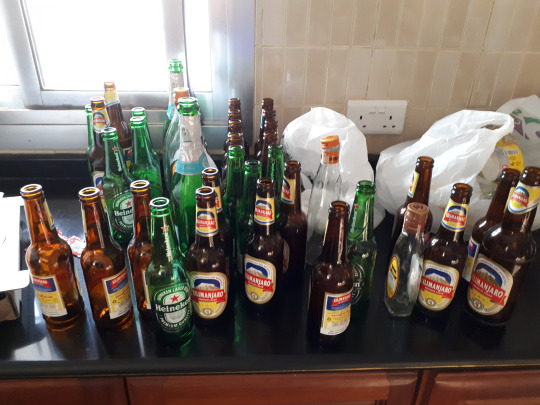
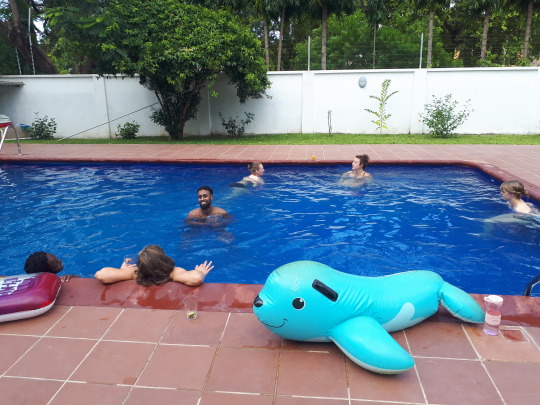

Things at the Embassy are going well. The most important news is that our Ambassador has presented his credentials to the President yesterday, so we are officially represented again! A good reason for us to eat cake. It had already been planned before, on a Sunday at 8 AM, but I guess the President decided he did have to go to church in the end. In the meantime, we have been working on a hundred different things. Our annual plan has been written and is now awaiting approval from The Hague. I have been gathering information about Madagascar, where the plague has broken out (yes, the one from the Middle Ages), to update information on the website. I can thus now proudly say I am a plague-expert. I have also been working on the Netherlands’ contribution to Mauritius 50-year independence, on a human rights movie event, and I went to a workshop about waste management. Perhaps I already said this before, but one of the projects the Embassy is assisting in, is the improvement of Dar’s waste management infrastructure. The biggest landfill will (hopefully) be rehabilitated, which will make it healthier for the people living and working there, and recycling facilities will be introduced. The workshop was about how to change people’s behaviour, via incentives and nudging. I think that’s a fascinating question, if you consider people’s behaviour regarding waste here: they throw everything on the ground. There is no education about this, so the difference between a banana peel and a plastic bottle is really no common knowledge. So often I have been in a car and the driver will just throw his plastic waste out of the window. Or sometimes you can’t swim in the sea because it is so dirty and smelly. It is just such a different perception than we have, and so difficult to change or even grasp. But very necessary nonetheless. Oh, and of course, I have been working on a sustainability project for the Embassy! As part of the Rank your Embassy-initiative, a ranking between Dutch embassies worldwide, I interviewed all staff-members and wrote an article about it (which will soon be online). I also prepared a powerpoint presentation about our sustainable practices, so for a week I made people walk the stairs and eat less meat and recycle. Some of the expat staff now even walks once a week to the Embassy, and we try do carpooling (aka me forcing people to give me a ride). The Ambassador presented the presentation at the regional conference in South-Africa, and now all embassies in the region will participate! The next step is of course to keep up our good behaviour, so we will have a group session about this.
Political developments in Tanzania are interesting, though not always encouraging. As you might have seen in the media back home, again a group of people associated with homosexuality has been arrested. The same happened in Zanzibar last month. Charges are “promoting homosexuality”, because the latter group was for example following a workshop on HIV/AIDS. Several HIV clinics have also been closed, so that’s not too good news. Also, schoolgirls who become pregnant are not allowed to return to school anymore. This because they would give a bad signal to other girls, and would not be able to raise their child and continue their education. Only vocational training will be allowed. I had an interesting conversation with an Uber driver about these issues, who was saying with regard to the school girls that it was perfectly fine because they can still go to private schools. Which of course hardly anyone can pay for. Plus they shouldn’t seduce men all the time. Often, girls living in rural areas have to walk for long distances, and get offered a ride by a boda boda (motor) driver. But only in return for something. It is so unfair that they are punished for this! About homosexuality, it was his opinion that people who stay single, choose to become homosexual (or lesbian), thereby choosing to not be a man anymore. So, what more to say. This is just one opinion. Sometimes the things happening in this country are insane and hard to wrap your head around. Because what about the people who have albinism, who are still being hunted and whose body parts are chopped off for spiritual beliefs? Or the elderly widows living in villages, who are believed to be witches (your eyes turning red is one of the signs for this), and are killed? Of course, many things happening are very positive and the economy is growing and all, but these are the human rights issues that fascinate and astonish me. And it touches upon the debate that we constantly had in my human rights classes last year: what is acceptable and what is it, till what point do you meddle in other cultures, or when are you imposing your own views?

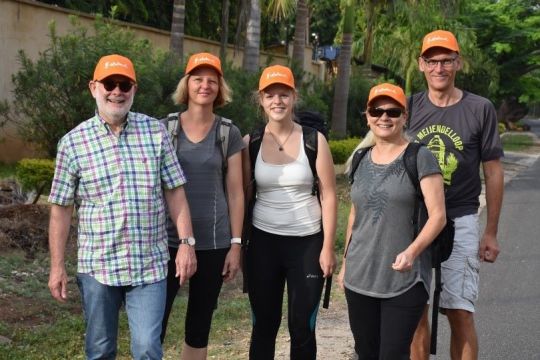
Although it is already some time ago, I also joined on a scoping mission for marine fisheries and aquaculture! Scoping mission scoping mission, what? This is done in preparation of a trade mission, when Dutch companies will visit a country to look for business opportunities, to explore and map out the sector. And somehow, thanks to my amazing colleagues, it was decided that it would be a good idea if I joined! Because next to being a plague expert, you of course all know me as the mastermind of marine fisheries and aquaculture (not). But it was so much fun, and it taught me how cool it can be to delve into a topic that is completely different than your field, but can be interesting nonetheless! Tanzania has a very long coastline, and a bunch of huge lakes, so the question is why the fishing industry has not yet developed that much. Together with Ulrich, our Economics/Trade Officer, and Rik, a trainee from Nairobi, we visited two companies in Dar es Salaam. Funnily enough, there was not one fish to be found in their factories. ;) Turned out it was the low season (the sea is too rough), so just small amounts of fish get processed. If I talk about fishermen, by the way, don’t imagine too much. The few big companies do have fleets, but most fisherman are just guys on surfboard or a tiny tiny boat, who try to catch a fish with one thin line. Or you will see these small wooden boats with 50 people in them, who look like they might topple soon. In some of the coastal areas, there is also a lot of overfishing, disturbing the balance of the ecosystem, and dynamite fishing is a big problem here. Room for improvement and development! Next morning we took the 7 AM ferry (travelling in royal class, obviously, where you get a tv with your seat but no headset, so everyone is just staring) to Zanzibar, where Omar, a very cheerful man from the ministry who seemed to know everyone on the island, gave us a tour. We visited an anchovies landing site, which I thought was very impressive. There is no dock, so the fishing boats sail towards the coast until they get stuck, from where women carry heavy buckets full of fish to the shore. There, the anchovies is boiled in steaming buckets, sorted on dozens of plastic canvases, and dried in the sun. And then it is transported to end up on your plate. I was shocked by how simple this process still is, and the hard physical labour that is being carried out mainly by women. Next stop was a seaweed farm, which was fascinating – when do you ever learn how seaweed grows? Small bits of seaweed are somehow tied to ropes, growing very fast in the (at that point) low tide water, which is harvested by (again) women. The surroundings were beautiful, and we bought some seaweed soap and –cookies. Seaweed is used in a lot of cosmetics, especially in Europe and the US. Finally, we dropped past the harbour and the fish market.



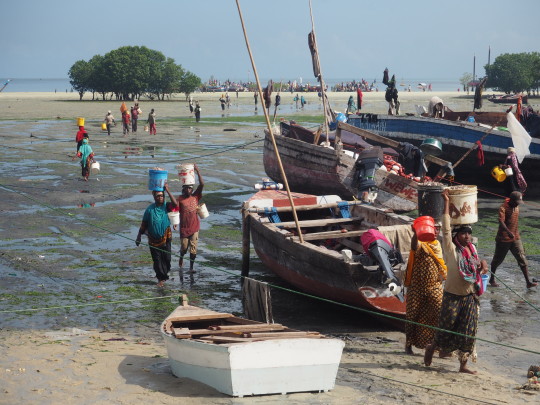
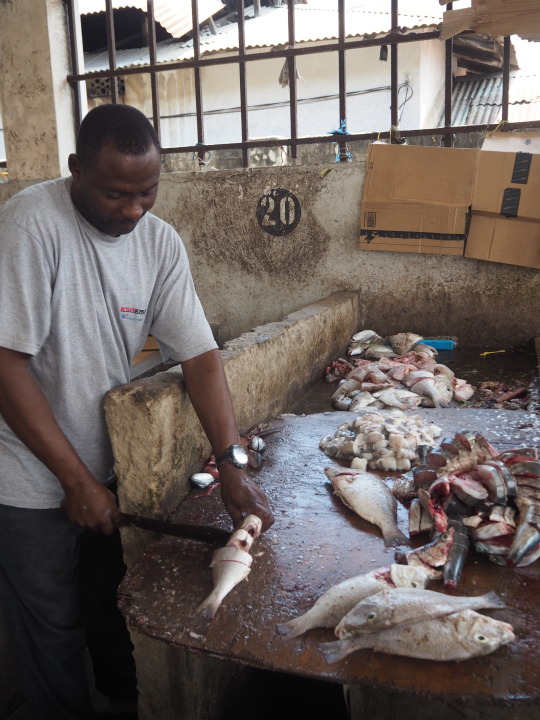

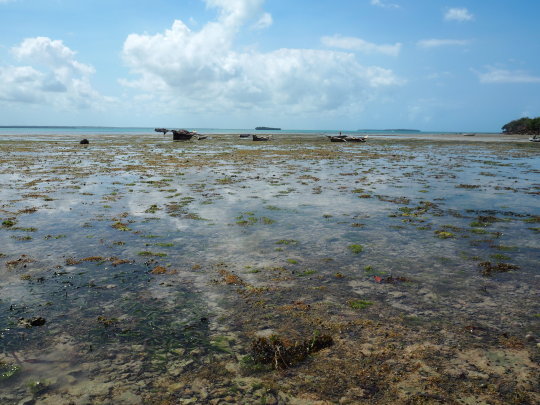


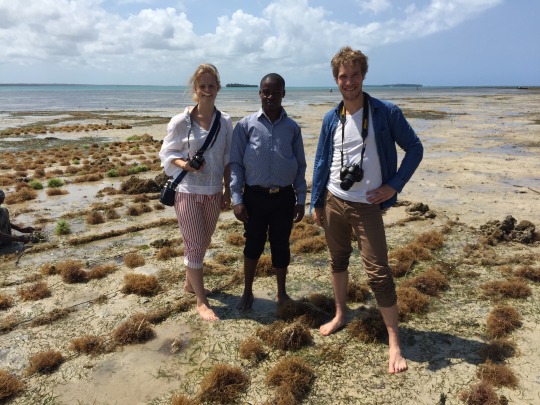
But the most spectacular part of the journey was yet to begin, because we then flew (jaja) to Mafia! This is another big island, 130 km south of Dar, and which is not visited by many people given the high flight costs. Despite the curious name, which is said to derive either from the Yemeni rules from the state of Ma’afir or the Arabic word ‘morfiya’ meaning group and thus archipelago, it was a lovely place to visit. The flight was spectacular, to say the least: in one of those tiny planes with 14 seats, flying over a big river delta called Rufiji, tiny tropical islands (where people actually live, imagine), coral reefs, and I swear I spotted a humpback whale. And guess who got to be the co-pilot!!! Absolutely stunning. Compared to Dar and Zanzibar, Mafia is a very quiet, and I must say quite poor, island. There was one big road from the airport to the other side of the island, big enough for four cars to drive next to each other, but every time we were the only one. We passed thousands and thousands of palm trees, and funnily enough, many of the mud houses had solar panels. While many of the hotels are so exclusive they cost $300 per night, I found a lovely and much more affordable hotel right beside a bay full of sea life, which was, with its diving school and cute bandas (huts), a haven of peace. After a delicious dinner and a good night’s sleep, we were summoned to the ministry first thing in the morning. The gentlemen had not been updated about our arrival, so they wanted to know what we were doing, but they turned out to have a real heart for the island and its marine conservation area. A big part of the island and most of the surrounding waters are a protected marine park, and as a visitor you pay a daily fee for this. We then went to visit another anchovies landing site, bigger and a bit more professional than the one on Zanzibar. And this was so typical: we were put on plastic chairs in a circle, and all the important people from the company joined, and talked at length in Swahili, with some interruptions in English in the meantime. It felt like one of those village meetings, that you so often see in the news or in movies about Africa. Afterwards, we had an hour left so Rik and I swam into the bay and stumbled upon a coral rock with the most beautiful fish swimming around. A brief glimpse of Mafia’s underwater life. It was too short, but I’ll be back! And although I am not entirely sure if fisheries is my new fascination in life, it was extremely interesting and I am very lucky and grateful to have been allowed to join!




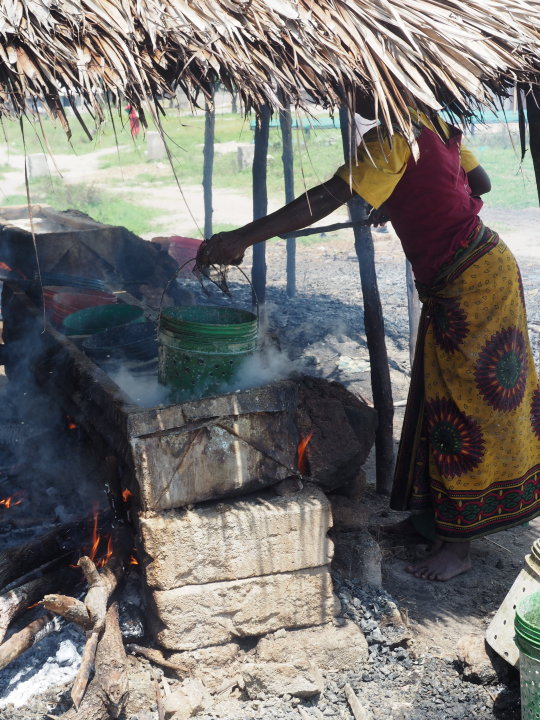




I will force myself to stop here and save the travel adventures for next time. All in all, time flies. Last week the vacancy for my successor was published, which means I am already half way! In December, a second intern specifically for agriculture will come, so I am very excited to get a buddy. This weekend I am going to hike in the mountains (yes of all weekends I chose the most rainy one), so wish me luck. I’ll give you a brief update next week about this and previous travel adventures, before my dad arrives!
Love, Julie
0 notes